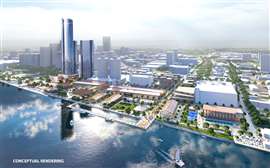Detroit riverside redevelopment plan includes demolition of two towers
26 November 2024
General Motors (GM) and Bedrock have announced plans to redevelop Detroit’s Renaissance Center (RenCen) and its surrounding 27-acre riverfront site, with significant demolition forming a key part of the project.
 Concept image of the redeveloped Renaissance Center site. (IMAGE: Bedrock-Gensler-Rossetti)
Concept image of the redeveloped Renaissance Center site. (IMAGE: Bedrock-Gensler-Rossetti)
The plan, which aims to create a mixed-use waterfront destination, will involve the demolition of the two office towers closest to the Detroit River, alongside other structural changes to reduce the site’s footprint.
The proposed demolition of the towers, described as “obsolete office space,” will clear the way for new public spaces and direct access to the riverfront. Additionally, the RenCen’s low-rise base structure will also be removed, enabling the creation of an open and inviting pedestrian promenade linking the site to downtown Detroit.
Kofi Bonner, CEO of Bedrock, commented on the project’s importance: “This iconic landmark’s future is important to Detroit and Michigan, and our shared vision with General Motors ensures that its redevelopment aligns with Detroit’s economic advancement.”
The remaining three towers of the RenCen will be retained and redeveloped to house a mix of hospitality and residential uses, while reclaimed land from the demolition will be used for new public spaces and amenities. The redevelopment also includes a complete reconfiguration of the site to improve accessibility for pedestrians and better integrate the complex with the city’s award-winning Riverwalk.
 Redevelopment of the Renaissance Center would require the demolition of two high-rise towers, reportedly known as Tower 300 and 400. (IMAGE: Bedrock-Gensler)
Redevelopment of the Renaissance Center would require the demolition of two high-rise towers, reportedly known as Tower 300 and 400. (IMAGE: Bedrock-Gensler)
“GM has the best possible partner with Bedrock in this effort to redevelop the Renaissance Center,” said Dave Massaron, GM’s Vice President of Infrastructure and Corporate Citizenship. “Nobody has repurposed more buildings in Detroit than Dan Gilbert and his Bedrock team.”
The plan represents a significant shift for the Renaissance Center, originally completed in 1976 and later acquired by GM in 1996. While GM has invested over $1 billion in improvements to the site, the redevelopment is seen as essential for ensuring its future viability.
Funding for the project will be primarily provided by GM and Bedrock, with additional support dependent on public financing. The companies are set to present the plan to local and state leaders in the coming weeks.
For demolition professionals, the project represents a substantial undertaking, with the removal of the two office towers and low-rise base requiring precise planning to preserve the structural integrity of the remaining towers and ensure the safe reclamation of materials. If approved, the demolition phase will mark a pivotal step in reshaping Detroit’s riverfront.
CONNECT WITH THE TEAM






